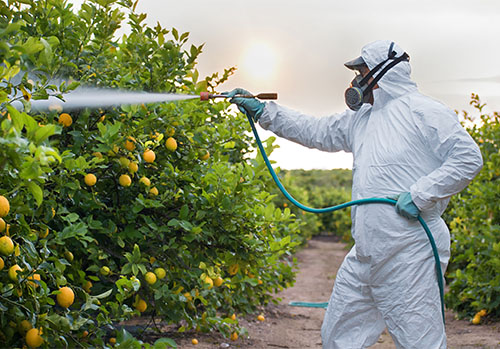
Image by David
Pesticides and Preservatives
Pesticides and preservatives are chemical terms that are well known today. These toxins are not just found in fields and gardens, but also in grocery stores! Buying produce comes with the risk of consuming chemicals that may be harmful to human health. The familiar saying “don’t judge a book by its cover” also pertains to buying produce!
What are Pesticides?
Pesticides, herbicides, insecticides, and more are sprayed on fresh produce during production. Pesticides usually serve as a protectant against natural occurrences like bacteria and mold growth as well as decay. Insecticides, fumigants, and repellents are typically smelly chemicals that repel insects and small animals like mice, birds, and spiders from eating or nesting in the produce. Other forms of pesticides like herbicides may cause leaves or foliage to drop from the plant to facilitate harvest or even hold oranges or apples onto the tree beyond their maturity to delay their growth, called growth regulators. Some may even act as a sprouting reducer for produce like potatoes and onions so they can maintain a certain size.
These sprays also help farmers grow “high quality” produce and boost production. Once harvested, the produce is usually shipped off to grocery stores or markets and then purchased by consumers. Although the farmers may rinse— not wash— the produce before shipping it to a grocery store, it may become contaminated in transit. The produce is then sprayed with many synthetic preservatives before they hit the shelves.
What are Preservatives?
Preservatives are chemicals used to keep produce like fruits and vegetables looking fresher longer after harvest, during transit, and before consumption. Before distribution, preservatives are sprayed on the unwashed produce. Because the produce is not rinsed beforehand, the outer coating of preservatives seals in chemically rich pesticides from the growth period, further contaminating it with toxins. Preservatives like food additives, fungicides, artificial colorants, and other chemicals are also sprayed on the crops. These chemicals are used to alter the texture, add vibrant colors, and give the produce a shine, making it more appealing to the human eye. If these chemical sprays are capable of all this, imagine what they can do to the human body!
Next time you are in the grocery store, look at the apples. Are they bright red, shiny, and waxy feeling? This shiny, waxy coating preserves and masks the apples’ external flaws by making it look plump, smooth, and flawless while also giving it a longer shelf life. Preservatives and waxes keep the produce looking fresh on the shelves for weeks, maybe even months after its harvest— but are they really “fresh” on the inside despite its flawless appearance? I don’t know about you, but I’d rather not buy— let alone consume— a week or month-old piece of fruit!
Eliminating Unwanted Chemicals
Consuming pesticides, chemical sprays, and waxes have been linked to many long-term health conditions such as diabetes, Parkinson’s disease, and lung, thyroid, and bone marrow cancers. Short-term conditions include sickness, nausea, vomiting, or even food poisoning. To eliminate consuming pesticides and preservatives, it is suggested to always wash your fresh produce thoroughly before storing it away to eliminate existing germs, residues, and even small insects from contacting other food items in your fridge. It is also highly recommended to wash the produce a second time before cooking or consuming— rinse and repeat! Peeling the produce is an alternative, however, it is said that washing and peeling your produce will not remove all traces of pesticides.
To avoid exposure to harmful chemicals not suited for the human body, it is recommended that you buy organic produce. Or, better yet, you can grow fresh produce at home! Ever wonder why organic or home-grown produce lasts for a shorter amount of time than store-bought produce? The key: lower amounts of preservatives and pesticides!
Buying organic or growing your own produce are fantastic alternatives and make it so you can still enjoy nutritious fruits and vegetables safely. It is a win-win for everyone!
Have Health Insurance Questions?
We hope that this information on pesticides and preservatives is helpful for you.
Insurance is oftentimes overwhelming and we want to shed light on the industry by answering your questions. Comment below and your question may be the topic of our next post!
If you liked this article, share it with your friends!
Empower Brokerage wants to help you find the insurance coverage you need and how to save money getting it. Stay on top of your health and give us a call at (844) 410-1320.
Get affordable health insurance quotes by clicking here.
See our other websites:

